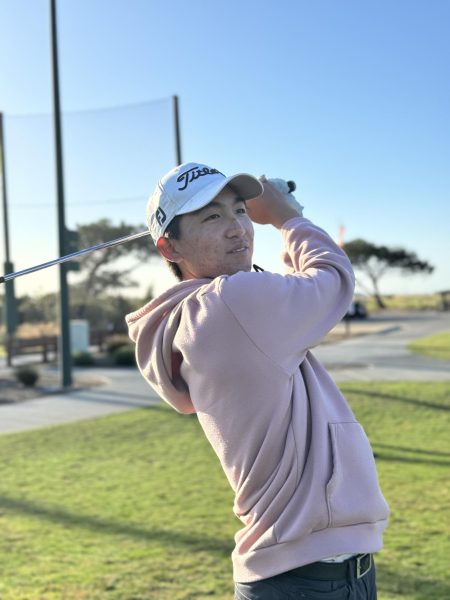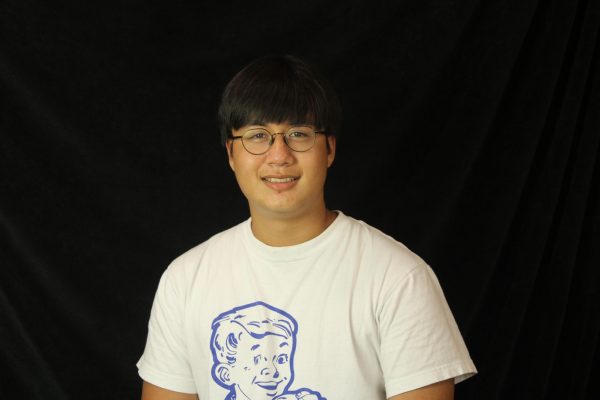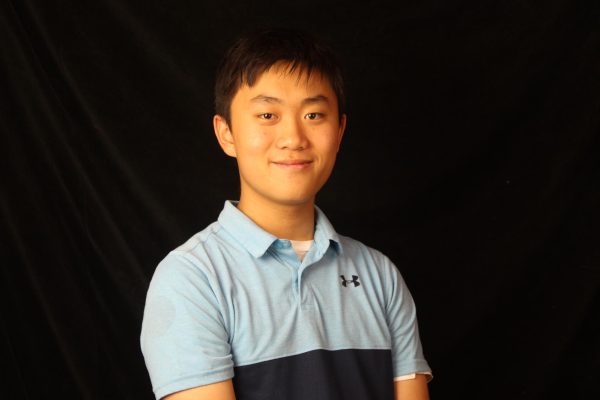
“First on the tee from Palo Alto: Joshua Wang!” The words fly across the Harding Park Golf Course on President’s Weekend — the grass still damp from the previous night’s rain — as Wang, a boy with dark brown hair and a black polo, steps onto the first tee box. Standing next to two of his opponents, he tunes his focus on a small white ball. Thwack! The ball sails through the air down the middle of the fairway.
In freshman year, Wang was the only golfer named the “Freshman of the Year” in the De Anza League. In his two years on the Paly varsity golf team, he has topped the individual leaderboards, leading Paly to win De Anza league titles and to qualify for the California Interscholastic Federation in 2022 and 2023. After performing well in tournaments across the state, Wang decided to withdraw from the varsity team for the 2024 season.
According to Wang, getting recruited to play sports in college is a task that spans months. First, the player must do well enough during tournaments so the college coach notices them. Then, the coach may get in contact and schedule an interview with the player to get to know more about them. Finally, the coach can extend an offer to the player, usually around June 15 if the player is performing at a high level, which the player can then accept or decline in a time-sensitive manner.
According to Wang, the recruitment process was demanding due to his lack of offers early on.
“The recruitment process was pretty stressful because there are a ton of people that committed really early,” Wang said. “The other commit that is going to Berkeley committed in June [as a rising junior] and I had no schools talking to me at that time. It’s stressful because all your peers are committing and you feel like no one’s talking to you. But, once you start playing better, it feels really good because all the coaches want to see you.”
Though there are no requirements for how well the player performs after the offer is accepted, they must maintain a certain GPA that is outlined by the college. Since most offers are given to seniors, you must fully impress the coach in order to receive an offer as a junior. This is why it is especially impressive that, in his junior year, Wang has already committed to the University of California, Berkeley to play Division One golf.
Outside of school, Wang competes in numerous U.S. Amateur and Junior Golf Association of Northern California events. He currently has a handicap of +3.3, meaning that he shoots 3.3 strokes under par on average, adjusted for the difficulty of the course. Wang also has two first-place finishes and numerous top-10 finishes throughout high school. He even occasionally competes with college players, where winning is even more challenging, and yet he still holds his own.
Unlike many high school golfers, Wang’s specialty is his approach shots, where he can hit a ball from anywhere within 200 yards to within 20 feet of the hole. It’s what allowed him to shoot a score of eight strokes under par at the Baylands Golf Links, giving him the best score of the day.
According to Viking varsity golf head coach Doyle Knight, Wang is confident in his abilities to take aggressive shots anywhere on the course.
“I liked that he isn’t afraid,” Knight said. “He is always playing aggressively. He learned how to play aggressively, to not be afraid and to learn from his mistakes. When he gets into college and stuff, he’ll have it under control.”
According to Wang, he started playing golf when he was very young to please his parents but eventually fell in love with the sport.
“I started playing golf when I was five years old,” Wang said. “I was pushed into the sport because my parents’ friend’s children were playing golf. They [my parents] basically said, ‘You’ve got to play golf as well.’”
Wang said the pressure that his peers put on him to compete at a high level motivated him to improve.
“Probably my peers had the biggest influence on me, the guys that I competed with growing up,” Wang said. “They may not know it, but whenever you see them shoot a good score, it pushes you to be better.”
Knight said that Wang’s consistent effort makes him a better player on the course.
“Joshua [Wang] is on a whole different level,” Knight said. “He has improved tremendously just because he’s wanted to go pro. So he just puts the time and effort in, and he gets better every year.”
Wang’s schedule is atypical as someone who prioritizes both getting out to the golf course and his performance in school.
“I’ll sleep until 5:45 a.m. and then I’ll do some bodyweight workout or stretching and then go to the course and practice,” Wang said. “After school, I go back to the course to practice. Once I’m done, I go home, have dinner, and then I spend some time on my homework. I usually have another practice session at home before I finally go to sleep.”
Wang’s key advice for athletes looking to get recruited is to be persistent.
“You have to be patient because, unless you’re like one of the top in your rankings, you’re not gonna have many schools making offers on June 15,” Wang said. “It might take a while but you just have to stay patient.”
According to Wang, his dreams are to go pro and play in the Professional Golfers’ Association Tour.
“We’ll have to see how college golf plays out,” Wang said. “It’s a lot easier [to go pro] after college with this tour called the PGA Tour University, so my goal is still to eventually join the official PGA Tour after I graduate from college.”



